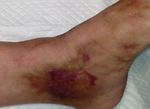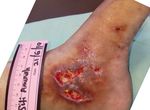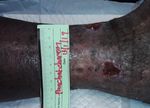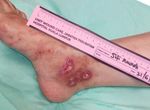A unique, multifunctional dressing in chronic wound management - Wounds International
←
→
Page content transcription
If your browser does not render page correctly, please read the page content below
Products & technology
A unique, multifunctional dressing in
chronic wound management
Wound experts worldwide are simplifying their formularies to produce a
class of innovative multifunctional wound care dressings. PolyMem (Ferris
Mfg. Corp.) is a multifunctional dressing that can replace common wound
care products such as alginates, hydrogels, hydrocolloids and foams. The
polymeric membrane dressing can be used as a primary or secondary
dressing and also as a combination to support the entire healing process.
This study demonstrates the efficacy of polymeric membrane dressings
in chronic wound healing by simple randomisation. The study took place
in an outpatient setting at the Wound Care Unit at Kuala Lumpur Hospital
Authors (clockwise from the
(WCUHKL) in Malaysia, where patients were given the standard of care
top left): by a WCUHKL nurse. Wounds were assessed using the TIME framework.
Harikrishna KR Nair, The wounds were cleansed using distilled water and debridement was
Sylvia SY Chong,
Mohd Hasbullah
done where necessary before being covered by polymeric membrane
dressings. All wounds dressed with polymeric membrane dressings showed
improvement and half closed within four weeks.
G
lobal life expectancy has doubled migration. Furthermore, when chronic wound
since the 1900s and is now more than fluid is added to cultures of keratinocytes,
70 years (Roser et al, 2013). The risk fibroblasts, or endothelial cells, it fails to
of developing chronic diseases increases stimulate DNA synthesis directly, in contrast to
with age. Chronic non-healing wounds are the DNA-synthesising ability of acute wound
increasingly recognised as an emerging fluid. Another key biochemical difference in
epidemic within healthcare. Although the chronic wounds is that they exhibit considerably
healthcare system has evolved tremendously higher protease activity than acute wounds
in the past few decades and continues (Leveriza-Oh and Phillips, 2005). Therefore we
to change for the better, chronic wound need to manage the exudate or fluids well to
management is a massive financial burden. De allow the wounds to epithelialise.
La Torre and Chambers (2019) define a chronic Prolonged wound management times can
wound as one that has failed to proceed delay chemotherapy and radiation treatments,
through the phases of healing in an orderly extract a significant toll on people’s quality
and timely fashion and shows no significant of life, compound psychological devastation
progress in 30 days. Types of chronic wound on top of injury and illness, and may lead to
Harikrishna KR Nair is Head of aetiologies include, but are not limited to, cosmetically unacceptable results (Ferreira et al,
Wound Care Unit, Department venous leg ulcers (VLU), diabetic foot ulcers 2006). Nussbaum et al (2018) estimate that up
of Internal Medicine, Hospital (DFU) and pressure ulcers (PU). to 2% of the population in developed countries
Kuala Lumpur; Sylvia SY Chong Wound bed preparation is crucial, suffer from chronic wounds.
is Research Assistant, Wound as emphasised by Sibbald et al (2000). The basic function of the wound care
Care Unit, Department of Management of devitalised tissue and materials is to protect from infection, absorb
Internal Medicine, Hospital slough with debridement, bacterial burden blood and exudate, promote healing and
Kuala Lumpur; Mohd and exudate management is important. possibly apply a medication to the wound. In
Hasbullah is a Staff Nurse, In contrast to acute wound fluid, chronic the past, the development of wound dressings
Wound Care Unit, Department wound fluid inhibits re-epithelialisation and was managed in accordance with personal
of Internal Medicine, Hospital contains degradation products vitronectin experience or historical knowledge. More
Kuala Lumpur and fibronectin, which inhibit keratinocyte recently, the development of advanced wound
42 Wounds Asia 2021 | Vol 4 Issue 1 | ©Wounds Asia 2020 | www.woundsasia.comProducts & technology
dressing has been guided by clinical studies and 2013; Haik et al, 2012; Tamir and Haik, 2008; Beitz
evidence-based medicine intended for better et al, 2004; Weissman et al, 2013; Hayden and
wound care management. Cole, 2003; Kahn, 2000), ensures non-adherence
Advanced wound dressings have evolved as to the wound bed (Tamir and Haik, 2008),
experts simplify their formularies to produce reduces time to epithelialisation (Rahman and
an innovative class of multifunctional wound Shokri, 2013; Weissman et al, 2013) and is also an
care dressings. PolyMem® is a multifunctional effective wound contact layer under negative-
polymeric membrane dressing comprising a pressure wound therapy (Skrinjar et al, 2011;
hydrophilic polyurethane matrix that contains Vanwalleghem, 2013).
a mild, non-toxic wound cleanser (F-68
surfactant), soothing moisturiser (glycerin), a Objective
superabsorbent starch copolymer and a semi- Use of the polymeric membrane dressings for
permeable backing film, which is not included healing of chronic wounds.
for cavity products (Ousey et al, 2015). Many
different types of studies, including case reports, Methods
clinical series, clinical evaluations, comparative This study was done by simple randomisation,
clinical trials, and randomised controlled trials, which involved application of polymeric
have found the polymeric membrane dressing membrane on patients with wounds of different
effective (Fiowler and Papen, 1991; Edwards aetiology. The study was carried out in an
and Mason, 2010; Wilson, 2010; Cahn and outpatient setting at the Wound Care Unit of
Kleinman, 2014; Benskin, 2018). Clinical evidence Kuala Lumpur Hospital in Malaysia (WCUHKL).
demonstrates that this dressing facilitates Patients were given standard of care by the
autolytic debridement (Agathangelou, 2011), WCUHKL nurse. Wounds were assessed with
reduces pain and inflammation (Agathangelou, TIME (tissue management, inflammation and
2011; Agathangelou, 2012; Rahman and Shokri, infection control, moisture balance, epithelial/
Case 1
■ A 35-year-old male with no known medical illness presented with a post-motor vehicle accident wound
10 June 2019 1 July 2019
Case 2
■ A 36-year-old male with no known medical illness presented with a postoperative l keloid
removed from the chest
7 June 2019 5 July 2019
44 Wounds Asia 2021 | Vol 4 Issue 1 | ©Wounds Asia 2020 | www.woundsasia.comCase 3
■ A 59-year-old female with a history of diabetes mellitus and hypertension developed an ulcer on
the right shin after exposure to hot infrared therapy
11 June 2019 9 July 2019
Case 4
■ A 40-year-old female with no known medical illness developed bilateral venous ulcer due to
long standing hours
21 June 2019 6 August 2019
Wounds Asia 2021 | Vol 4 Issue 1 | ©Wounds Asia 2020 | www.woundsasia.com 45Products & technology
Case 5
■ A 58-year-old male with a history of diabetes mellitus and hypertension presented with a right
lower limb chronic venous ulcer
13 January 2019 14 April 2019
Case 6
■ A 67-year-old male with a history of diabetes mellitus and hypertension presented with a left
hallux diabetic foot ulcer
10 June 2019 6 August 2019
edge advancement) framework. The wounds insufficiency. Compression was applied and the
were cleansed using distilled water and wound closed in 12 weeks.
debridement was done where necessary before
being covered with polymeric membrane Discussion
dressings. Crepe bandage was used for the post- PolyMem is a multifunctional dressing that
motor vehicle accident wound, postoperative is proven to effectively cleanse, fill, absorb
wound, post-radiation wound and the diabetic and moisten wounds throughout the healing
foot ulcer. A two-layer compression bandage processes. The polymeric membrane dressing
was applied for those patients with chronic helps maintain a clean wound bed by loosening
venous ulcers. necrotic tissue, slough and other debris. The
hydrophilic polyurethane membrane matrix,
Results containing a superabsorbent starch co-polymer,
We recruited six patients with different wound draws fluid and debris from the wound bed
aetiologies, post-motor vehicle accident wound, and swells into a non-adherent gel, which helps
postoperative wound, post-radiation wound, reduce the risk of maceration. Additionally,
chronic venous ulcer and DFUs?. glycerol helps to ensure non-adherence to the
All wounds showed improvement and half wound bed so that the dressing can be removed
the cases closed within four weeks. The venous without disturbing the healing tissues. Glycerol
leg ulcer took longer owing to chronic venous also helps to control odour while softening
46 Wounds Asia 2021 | Vol 4 Issue 1 | ©Wounds Asia 2020 | www.woundsasia.comnon-viable tissue. The membrane is covered membrane dressings for skin graft donor sites. Six
years’ experience on 1200 cases. Poster. WUWUS,
by a semi-permeable continuous film, which
Japan, 2012. https://tinyurl.com/y2d3vlo6 (accessed
is optimised for oxygen and moisture vapour 10 January 2021)
permeability, and acts as barrier to liquids.
Hayden JK, Cole BJ (2003) The effectiveness of a pain
The polymeric membrane dressing was wrap compared to a standard dressing on the
effective in wound closure in all six wounds, reduction of post-operative morbidity following
however, the study is limited due its small routine arthroscopy. Orthopedics 26:59–63. https://
sample size. doi.org/10.3928/0147-7447-20030101-16
Kahn AR (2000) A superficial cutaneous dressing inhibits
Conclusion inflammation and swelling in deep tissues. Pain Med
1(2): 187
The polymeric membrane dressing is an all-
Leveriza-Oh M, Phillips T (2005) Dressings and
in-one, easy-to-use dressing that can replace
postoperative care. In: Robinson JK, Sengelmann RD,
common wound care products such as alginates, Hanke CW, Siegel DM (eds) Surgery of the Skin (1st
hydrogels, hydrocolloids and foams. The ability edn). Mosy
to combine a number of actions can simplify Nussbaum SR, Carter MJ, Fife CE (2018) An economic
dressing selection, reduce risk and improve evaluation of the impact, cost, and medicare policy
outcomes. In addition, the polymeric membrane implications of chronic nonhealing wounds. Value
dressing can be used as a primary or secondary Health 21(1):27–32. https://doi.org/10.1016/j.
jval.2017.07.007
dressing, or as combination of both to aid the
healing process in its entirety. Ousey K, Agathangelou C, Denyer J et al (2015)
WAS
PolyMem dressings Made Easy. Wounds International.
https://tinyurl.com/dpj6nufb
Declaration of interest:
Rahman S, Shokri A. Total knee arthroplasty infections
The authors have no conflicts of interest to eliminated and rehabilitation improved using
declare, and received no funding for this study. polymeric membrane dressing circumferential wrap
technique: 120 patients at 12-month follow up.
References Poster. EWMA, 2013. https://tinyurl.com/yxraboo4
Agathangelou C. An easy, effective and almost painless (accessed 10 January 2021)
way to debride and heal arterial ulcers. Poster. Roser M, Esteban O-O, Ritchie H (2013) Life Expectancy.
EWMA, 2011. https://tinyurl.com/y2wrnncd (accessed Published online at OurWorldInData.org. https://
10 January 2021)
ourworldindata.org/life-expectancy. (accessed 10
Agathangelou C. Three years’ experience of treating January 2021)
46 painful diabetic foot ulcers with polymeric
Sibbald R, Williamson D, Orsted H et al (2000) Preparing
membrane dressings. Poster. EWMA, 2012 https://
tinyurl.com/yxbusayk (accessed 10 January 2021) the wound bed – debridement, bacterial balance,
and moisture balance. Ostomy Wound Manage 46(11):
Beitz AJ, Newman A, Kahn AR et al (2004) A polymeric
14–24
membrane dressing with antinociceptive properties:
analysis with a rodent model of stab wound Skrinjar E, Duschek N, Bayer G et al. Efficiency of
secondary hyperalgesia. J Pain 5(1): 38–47. https:// local wound treatment by combining polymeric
doi.org/10.1016/j.jpain.2003.09.003 membrane dressings and negative pressure wound
Benskin LL (2018) Evidence for polymeric membrane therapy. Poster. EWMA, 2011
dressings as a unique dressing subcategory, using Tamir J, Haik J. Polymeric membrane dressings for skin
pressure ulcers as an example. Adv Wound Care (New graft donor sites: 4 years’ experience on 800 cases.
Rochelle) 7(12):419–26. https://doi.org/10.1089/ Poster. SAWC, October 2008
wound.2018.0822
Vanwalleghem G. Four years’ experience of effectively
Cahn A, Kleinman Y (2014) A novel approach to the treating compartment syndrome by combining
treatment of diabetic foot abscesses - a case series.
NPWT with polymeric interface layer. Poster. EWMA,
J Wound Care 23:394–9. https://doi.org/10.12968/
2013
jowc.2014.23.8.394
Weissman O, Hundeshagen G, Harats M et al (2013)
De la Torre JI, Chambers JA (2019) Chronic Wounds.
Custom-fit polymeric membrane dressing masks
Medscape. https://emedicine.medscape.com/
article/1298452-overview (accessed 10 January 2021) in the treatment of second-degree facial burns.
Burns 39(6):1316–20. https://doi.org/10.1016/j.
Edwards J, Mason S (2010) An evaluation of the use of
burns.2013.03.005
PolyMem Silver in burn management. J Community
Nurs 24:16–9 Wilson D. Application of Polymeric Membrane Dressings
Fowler E, Papen JC (1991) Clinical evaluation of a to Stage I Pressure Ulcers Speeds Re- solution,
polymeric membrane dressing in the treatment of Reduces Ulcer Site Discomfort and Re- duces Staff
dermal ulcers. Ostomy Wound Manage 1991;35:35–44. Time Devoted to Management of Ulcers. Poster # CS-
128 presented at: Symposium on Advanced Wound
Ferreira MC, Tuma P Jr, Carvalho VF, Kamamoto F (2006)
Care (SAWC)SPRING; 2010 Apr 17; Orlando, FL, USA.
Complex wounds. Clinics (Sao Paulo) 61(6):571–8.
https://doi.org/10.1590/s1807-59322006000600014
Haik J, Weissman O, Demetris S et al. Polymeric
Wounds Asia 2021 | Vol 4 Issue 1 | ©Wounds Asia 2020 | www.woundsasia.com 47You can also read



























































